The NATO Summit: a Historic, Triumphant Exercise in Media Fakery
Lo and behold, I was able to attend the NATO Summit in Madrid this week. There’s plenty to discuss on a substantive level about what emerged from the grandiose gathering — for one thing, the contours of what could very well be the next World War were pretty much formalized. Which seems significant. But first, I want to offer a few “meta” observations regarding how the Summit operated on a practical level. Because attending a NATO Summit is not something that most people reading this article will ever do, nor is it something that most people on Earth will ever do. So there are some peculiarities worth noting for the record.
I have to admit, I was somewhat surprised when I found out I was approved for accreditation; I’d kind of thought applying was just a shot in the dark. A few months ago, as some may recall, I’d been denied admittance to what was termed an “Extraordinary” NATO Summit, convened in Brussels on short notice to address urgent contingencies involving the Ukraine war. Pursuant to this denial, I was also ejected from the grounds of the Belgian Ministry of Defense, which isn’t a thing that has any obvious reason to exist.
But this latest affair in Madrid was NATO’s big, annual, hotly-anticipated Summit, so I guess they reasoned it would be prudent to let in anyone who seemed moderately qualified. Including me. Maybe to at least give the appearance of upholding their high ideals around preserving “liberal democratic values,” and thus their (nominal) openness to robust media scrutiny. Frankly, I’m not sure what considerations went into the decision to allow my individual entry, but they gave me the OK, so there you have it. Per emailed instructions, I showed up to some high school in Madrid on Monday, obtained my dopey customized press badge, and was off to the races.
A key thing to understand about the relative laxity of the accreditation process, as I quickly discovered, is that at least half — maybe more — of the journalists in attendance at this Summit had absolutely no need to be there. Meaning that, as far as I could tell, nothing they did necessitated their physical presence at the actual convention hall; they could’ve easily performed their vital journalistic tasks at home from behind a computer or in front of a green screen. There were rows and rows of TV journalists set up in the capacious Media Center that NATO so kindly provided, and all these journalists seemed to do over the course of the three days was perform contrived “stand-up shots” for the cameras, wherein they summarized general facts about the developments at the Summit — the same general facts anyone with an internet connection could find in two seconds. But because they happened to be reciting these general facts from inside NATO’s official Media Center, it was apparently believed that they were bringing some impressive journalistic authority to bear.
Natasha Bertrand, one of US media’s most dedicated Russiagate fabulists, was naturally on hand, under the auspices of her current gig at CNN. It’s nothing new for journalists to systematically botch a story in spectacular fashion, and then subsequently be rewarded with a steady succession of lucrative media gigs — that’s basically how the industry works. But Natasha perfectly embodies this longstanding phenomenon among the younger generation of media stars, seeing as she proudly advertises her status as an alum of the “Forbes 30 under 30” list in her Twitter bio. Bertrand’s daily routine seemed to consist of sitting on her laptop at the specially-designated CNN table, and then getting up every so often to conduct a live “stand-up shot” for TV, wherein she would summarize in general terms what was going on that day at the NATO Summit. Then she’d sit back down at the CNN table, peck away at her laptop, and eventually return for another supremely informative “stand-up shot.”
In fairness to Natasha, she did also appear to attend a few press conferences. I’d gone to one held by Jens Stoltenberg, the hapless NATO secretary-general, and specifically asked a NATO handler on the scene whether the press conference was going to be free-form — meaning, whether anyone with their hand raised could theoretically be called on to ask a question. The handler assured me that yes, of course this was the case.
But then old Jens strolls in, along with another NATO press operative who physically joined him onstage, and sure enough — it was definitely not the case that anyone could be called on at this particular press conference. Sadly, any organic exercise in the high ideals of a Free Press would have to wait for another day. Instead, the operative accompanying Stoltenberg came equipped with a booklet containing a pre-selected list of journalists who were approved to ask questions. Just before the press conference commenced, I noticed Natasha being briskly escorted into the room by the original NATO press aide I’d spoken with, who proceeded to generously guide her to a prime seating location. Then in a stunning turn of events, you won’t believe who was picked first to ask a question: me! Just kidding, it was Natasha Bertrand.
Natasha is definitely a useful avatar for the kind of journalist likely to be observed in the wild at a NATO Summit. In order to attend, you have to surmount a number of obstacles. The first being cost: unless you’re a local in Spain, just getting to the Summit is going to be a significant expense, with airfare and hotel and such. I’m not breaking any news when I report that prices of plane tickets right now are absurdly high. So the journalists who manage to find a way to incur these costs are going to be a relatively affluent bunch, or work at publications willing to pay their relatively burdensome expenses. And if they’re willing to go through the trouble of organizing such a trip, chances are it’s because they already revere NATO, and are already ideologically invested in what they believe to be NATO’s noble mission. Natasha appears to fall in this camp.
But there’s also another camp of journalist — the ones who are just wearily assigned to cover the NATO Summit for whatever reason, and who maybe don’t have particularly strong ideological convictions in the virtues of NATO one way or another, but are boring and incurious enough that it would never even occur to them to ask a genuinely probing question about anything having to do with NATO. I honestly may have been the only journalist there who approached the Summit with even a mildly critical disposition toward the fundamental utility of NATO. Or at least, I’m not aware of any others.
So here was Natasha Bertrand’s big question to Jens Stoltenberg, the one she was pre-selected to ask right off the bat. (“Start with CNN,” the NATO press aide on stage with Stoltenberg directed.)
“I’m wondering,” Bertrand politely inquired, “if you could talk a bit more about the meetings you had over the day about ironing out the details of the new force model, and that includes the question of permanent basing… I’m wondering whether NATO has any plans to put permanent bases in those countries [Finland and Sweden] now that they’ve been formally invited into the Alliance.”
Essentially, Bertrand was asking Stoltenberg to elaborate on the logistical plan for when/where NATO troops would be eventually stationed in Finland and Sweden, once they’re officially granted membership. In other words, she wasn’t questioning any premises, challenging any contradictions, or highlighting any discrepancies. She was simply prompting Stoltenberg for additional exposition about the thing (formal membership invitation to Finland and Sweden) that he happened to be announcing. This is the ideal question for Stoltenberg, because it’s like being assisted by a helpful teammate — rather than being probed by someone who conceives their role as remotely adversarial. To the extent Bertrand has evinced interest in challenging Stoltenberg, it’s on his purportedly insufficient willingness to make commitments about the deployment of NATO forces. In particular, Natasha seems to have a real passion for the issue of expanded NATO basing in eastward territories:
On March 23, ahead of the previously mentioned Extraordinary Summit at NATO Headquarters in Brussels, Bertrand was of course comfortably ensconced in the pre-selected press roster. And here’s what she asked: “Mr. Secretary General, Estonia has been calling for NATO to build up a permanent force in the region that is capable of stopping a Russian offensive, but the NATO-Russia Founding Act technically does not allow the Alliance to establish permanent military basing in so called new member states. And so I’m wondering if you believe that it’s time to repeal the NATO-Russia Founding Act, given its invasion of Ukraine?”
Then on March 24, also in Brussels, she really mixed it up by asking: “I am wondering, did you discuss during this meeting a permanent basing of forces in any of these countries such as the Baltics and abandoning the NATO-Russia Founding Act?”
Notice in all these questions, the goal is to elicit commitments from Stoltenberg about the expansion of NATO forces. That’s the bold, accountability-driven journalism practiced by Bertrand with the imprimatur of CNN. And it was evidently this line of questioning — plus her passionate interest in the issue of permanent basing — that got Bertrand once again hooked up for preferential access at the Madrid summit.
Following Bertrand’s latest ground-breaking question regarding the prospect of establishing more NATO bases in Scandinavia, the onstage NATO press aide, studying the pre-approved list of journalists, summoned a Ukrainian woman from the outlet “Interfax” to ask the next question. This journalist began by wishing Stoltenberg a Happy Birthday, and then said: “Thank you from all of my colleagues for everything you are doing for us.” As you might imagine, a hard-hitting question did not follow.
Speaking of Ukrainian individuals in attendance at the Summit: at one point, I came across a Ukraine government official who said he worked for the Ukraine embassy in some fashion, though he was vague about which embassy in particular and what his actual job title was. I asked if I could do a brief interview with him, and he said no, because “We have a special procedure for all interviews.” Which meant I would probably have to email twelve different generic email addresses, send twelve additional follow-up emails, and then in all likelihood nothing would happen. The whole point of being physically present at this Summit, one might have thought, was that it allowed for spontaneous journalistic encounters with relevant power-wielding individuals — without having to jump through a dozen different intermediary hoops. But apparently this was not a philosophy adhered to by the Ukrainian government officials in attendance, despite the fact that this particular guy was walking around the Media Center. No media access allowed in the Media Center!
In terms of Stoltenberg, I never did get to ask him a question. He was conducting the press conference upon the announcement of a gleaming new NATO strategy decree, the first NATO has issued since 2010. In the decree, Russia is of course castigated as a “direct threat” to the alliance, and the prospect is floated that Russia may soon attack a NATO member state. But perhaps most consequential is that the document officially binds together Russia and China as conjoined enemy targets, with China’s statecraft denounced as “malicious.” In past decrees, China was never even mentioned. There was also a big show made of the fact that for the first time, the leaders of Japan, South Korea, Australia, and New Zealand were invited to attend the Summit at a “partner” level — a demonstration of NATO’s newfound resolve to assert itself in the “Indo-Pacific” region, as a counterweight to China.
So the question I would’ve posed to Stoltenberg was something like this: “Whenever criticisms are made of NATO’s activities, whether by Russia/China or others, you are quick to insist that NATO is purely a ‘defensive’ alliance. Indeed, this is repeated once again in the new Strategy Decree. But can it really any longer be said that NATO is a ‘purely defensive alliance,’ when it’s now touting the expansion of its remit into the Indo-Pacific? Because that’s a heck of a long way geographically from NATO’s original remit — i.e., the North Atlantic, hence the name of the organization. How could it not be fair to say, at the very least, that NATO is now an expansionist alliance? You know, given that you’re explicitly touting your expansion into a region on the other side of the world?”
Stoltenberg shrewdly escaped my grasp, but I did ask this question to the Canadian Minister of Foreign Affairs, which I’ll cover in a subsequent article — along with interactions I had with various other officials from Finland, Latvia, and elsewhere. (Subscribe!) And I was able to articulate a brief version of this point on the BBC World Service, which somewhat surprisingly extended me an invitation to give a commentary on the Summit for its flagship broadcast last Thursday morning. The reason I found this somewhat surprising was that the BBC knew in advance what the thrust of my “take” was going to be, and therefore knew my “take” would diverge fairly sharply from the usual media conventions. I know they knew this, because I spoke to a producer about it ahead of time! But still they wanted me on, maybe because of the unconventionality? Which would be somewhat surprising, and interesting.
On the final day of the gathering, many of the national leaders made themselves available for their big end-of-summit press conferences. For the first round, I opted to press my luck with Boris Johnson, on the off-chance that maybe he’d have a flicker of adventurous spirit and call on people who hadn’t been pre-filtered for journalistic propriety. Ignoring the sheets of paper that had been placed on the first few rows of chairs, annoyingly announcing that they’d been “RESERVED FOR UK LOBBY” — the rarified group of journalists designated to follow Johnson around everywhere he goes — I sat right up close, within sneezing distance of the estimable Prime Minister. Nobody noticed that I’d scuttled the phony seating rule, so there I was, vividly beholding Alexander “Boris” de Pfeffel Johnson in the flesh:
We were close enough to make direct eye contact several times. And yet, there was evidently no chance in hell that I was ever going to be able to ask a question, unless I stood up and started screaming wildly, which I’m not sure would’ve been the wisest move under the circumstances. Because as luck would have it, the Prime Minister came equipped with an iron-clad list of pre-selected journalists to call upon, just like Stoltenberg had. The list included some blokes who appeared to be his mates, such as Harry Cole of The Sun. While we were awaiting Johnson’s arrival, I overheard Cole snickering about how Boris had not changed his phone number — the one he’d had for several decades, since his old days as a journalist — until two years into his tenure as Prime Minister, and continued to use that number to chat away unsecurely over Whatsapp.
But here’s the question I would have asked. Mind you, Boris had just repeated the “purely defensive alliance” cliche verbatim in his opening remarks:
“Can you confirm reports that you’ve personally beseeched President Zelensky that he must not accept any diplomatic settlement that includes territorial concessions, and if so, is it your understanding that the Biden Administration agrees with you on this point? Secondly, can it really be said any longer that NATO is a ‘purely defensive alliance’ given its intensified focus on China, which geographically is quite far from the so-called North Atlantic? Because that seems more like an expansionist alliance.”
Apparently this content would’ve been too hot for Madrid!
My next post in this NATO mini-series will cover the press conferences I attended with, among others, Joe Biden and Recep Tayyip Erdoğan of Turkey — the latter of whom I unexpectedly was able to ask a question. Plus I’ll cover some other stuff that underscores one of my primary takeaways from the whole experience: NATO Summits really need to be understood first and foremost as exclusive networking opportunities for “national security professionals,” and that’s a category which very much includes journalists. Adopt this frame, and you’ll better understand why coverage of the Summit comes across like a hometown newspaper’s coverage of their school football team.


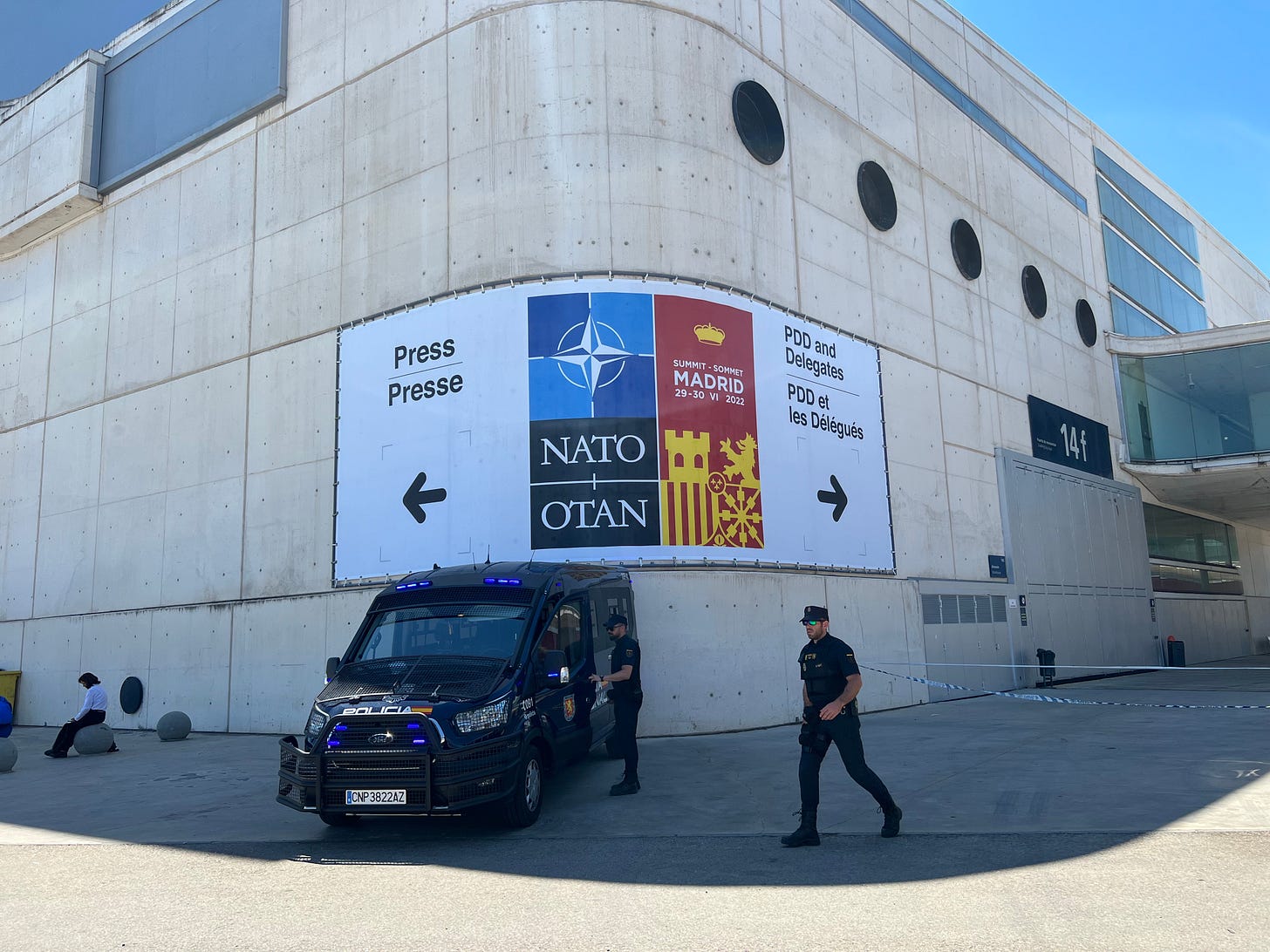
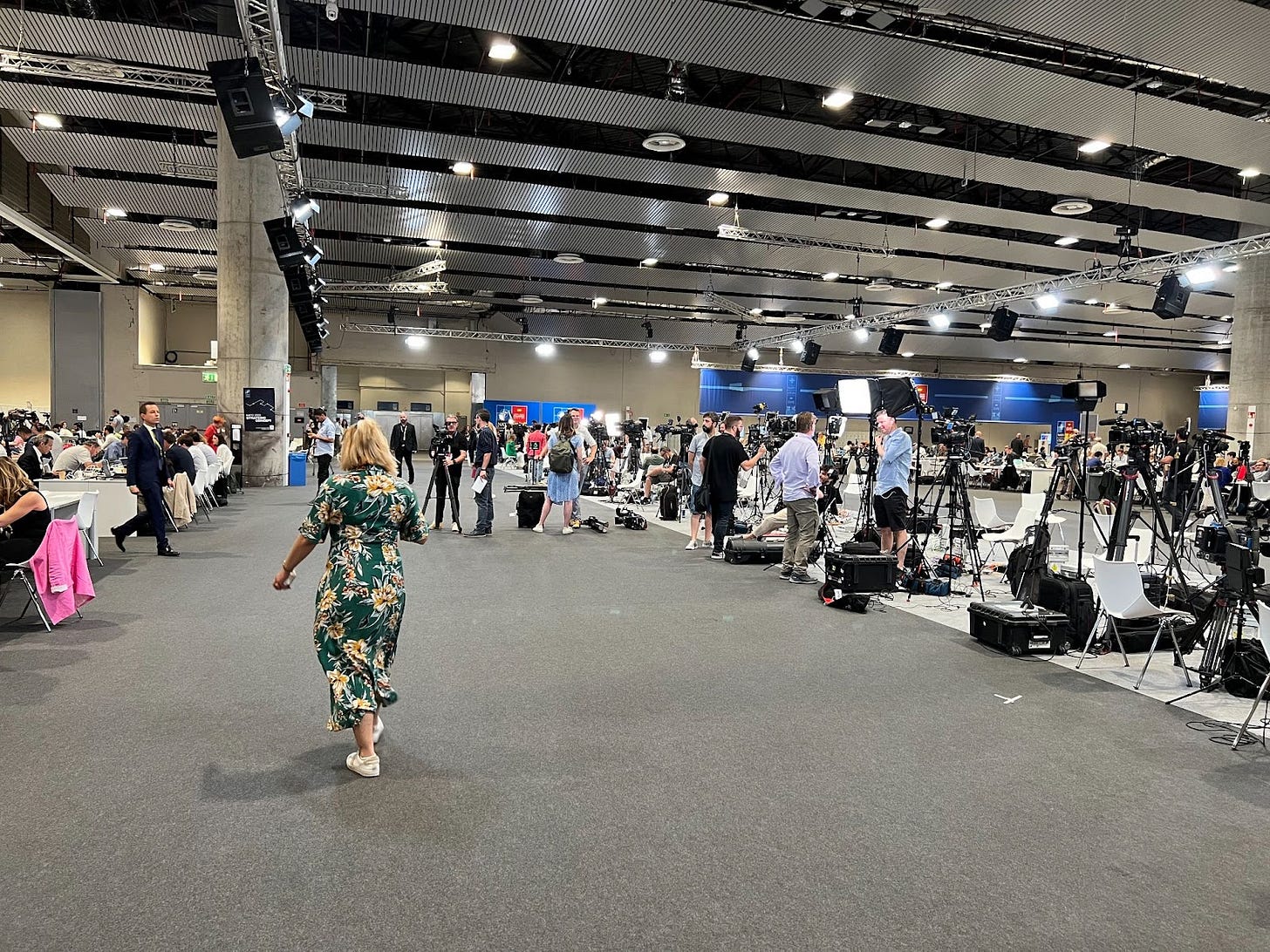
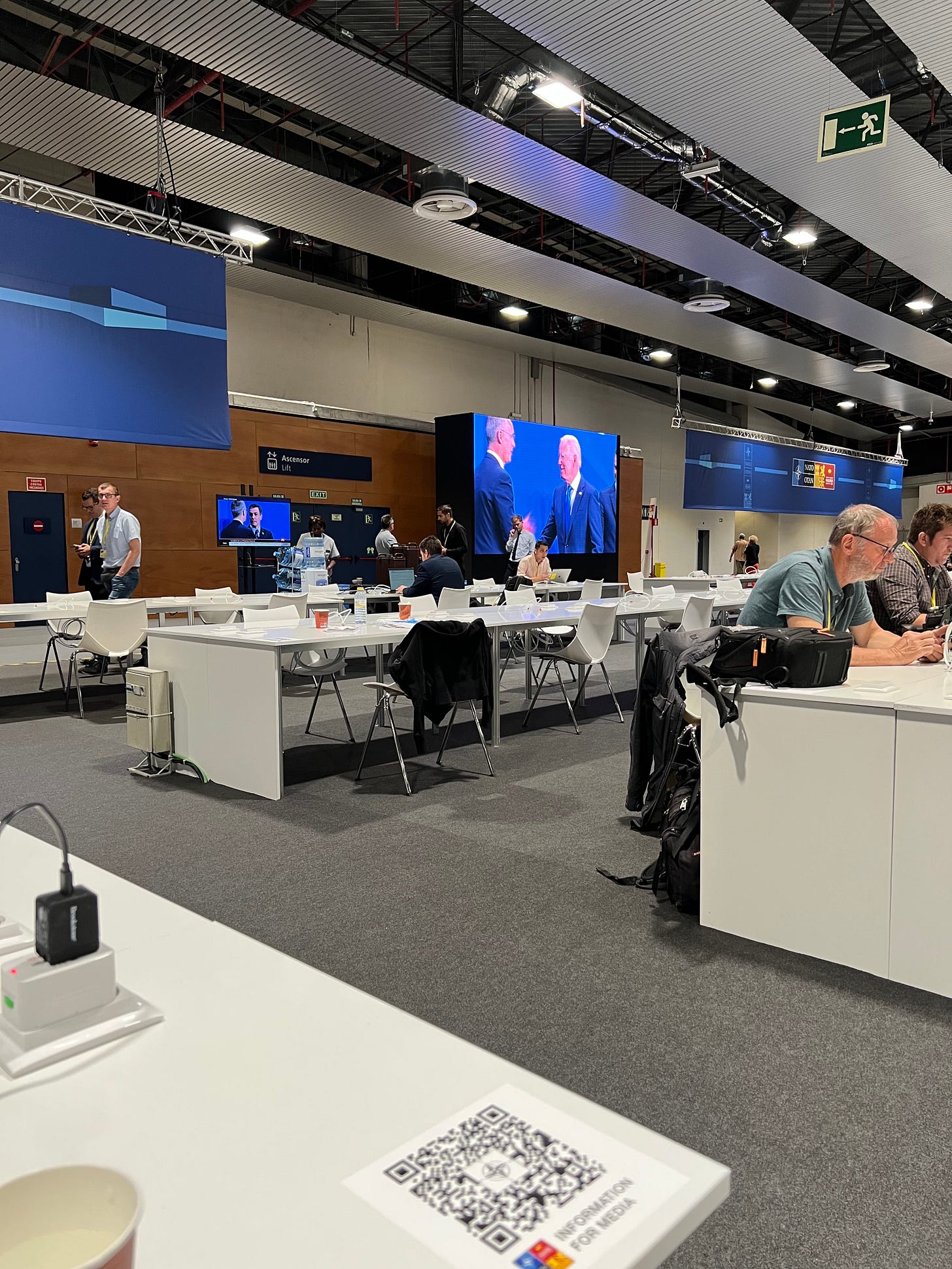
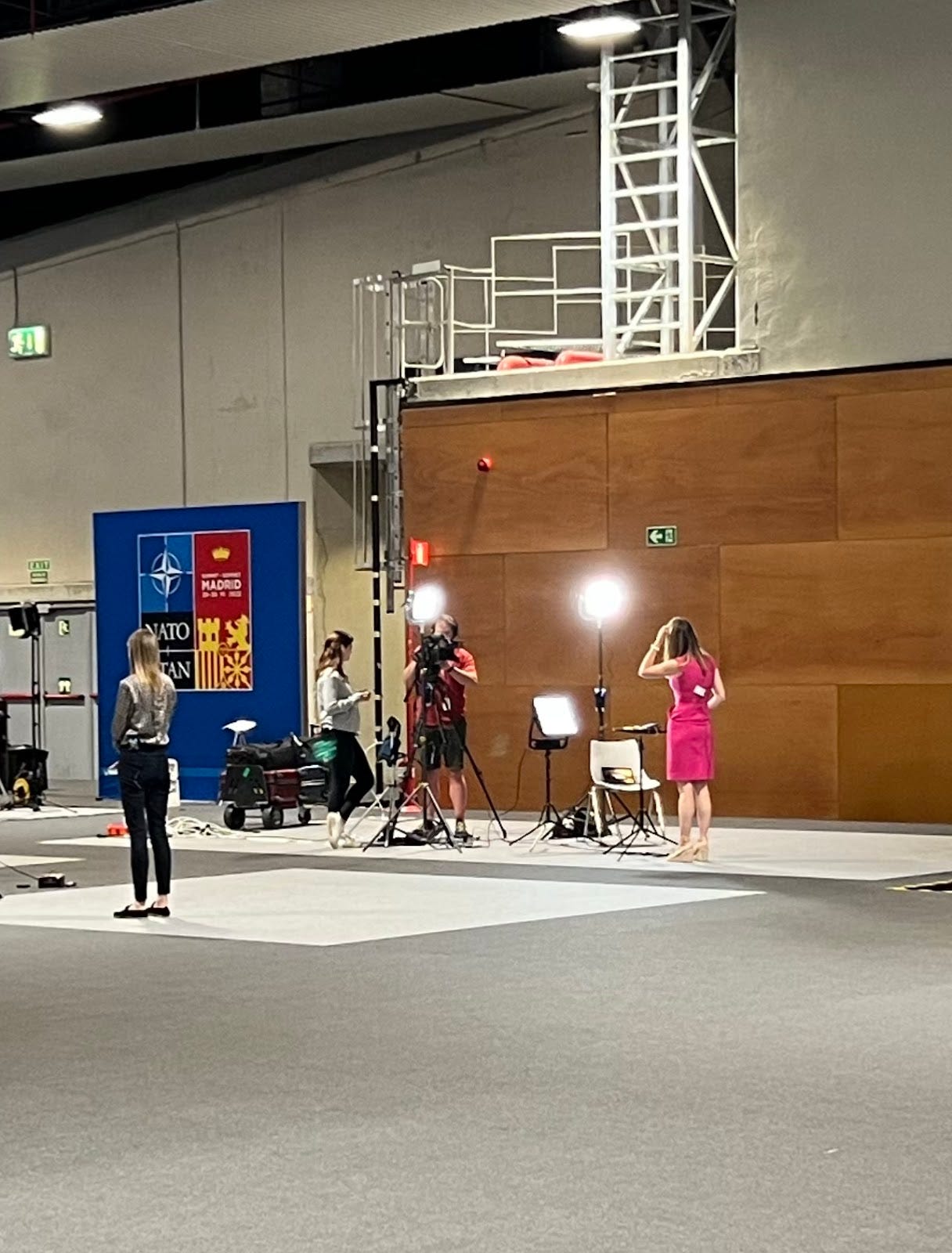
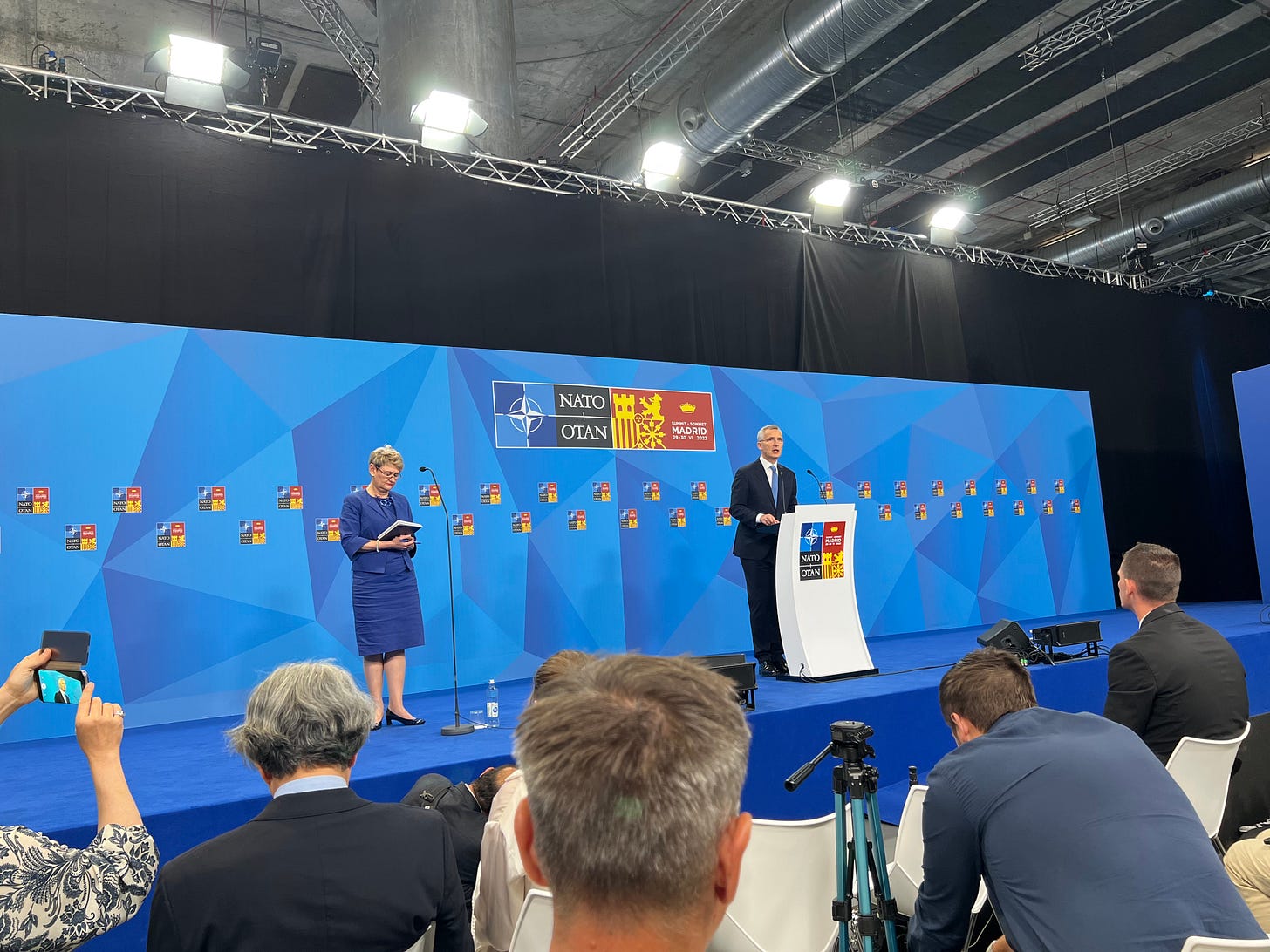
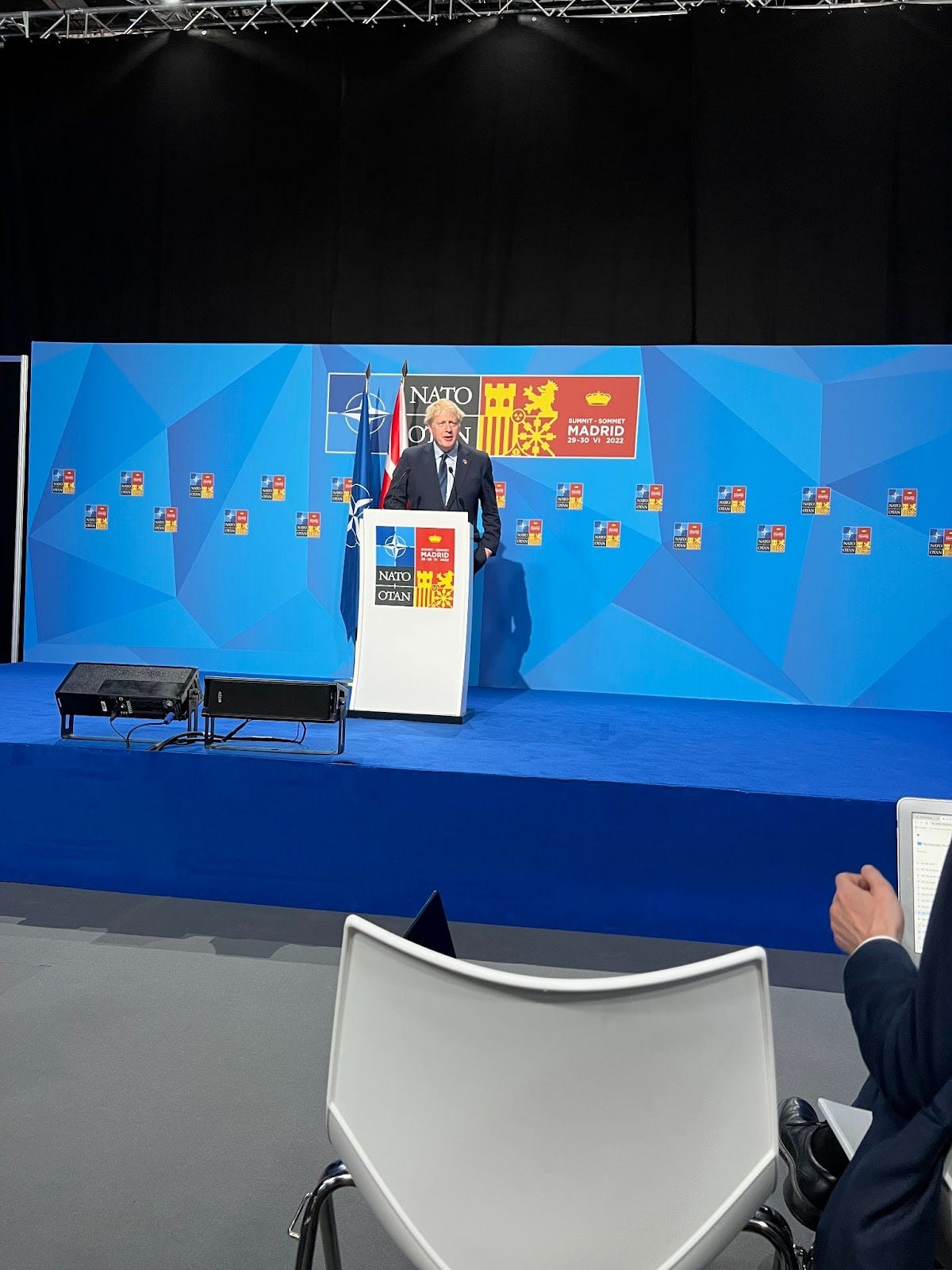
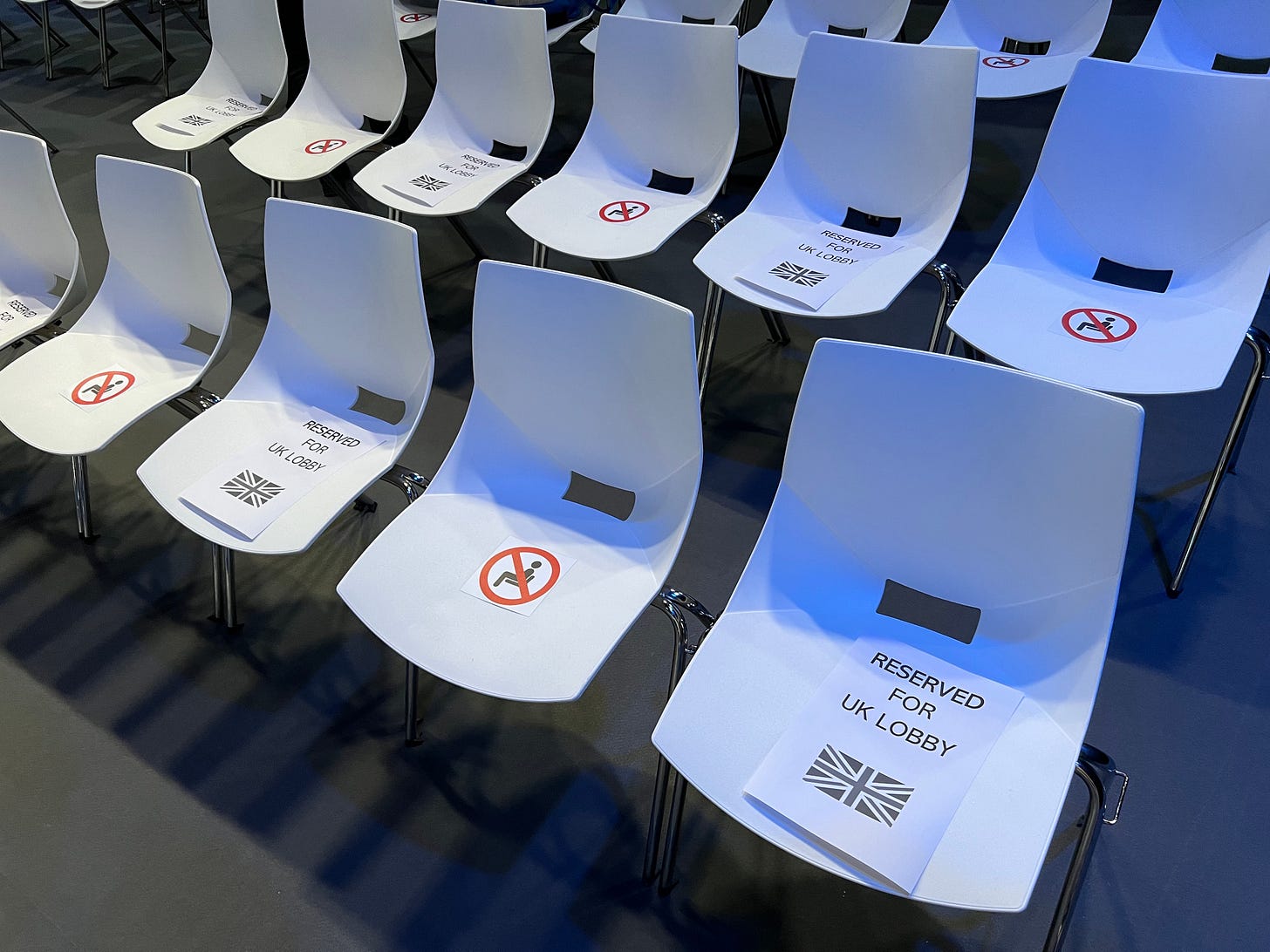
NATO is nearly nothing more than an enormous money-laundering scheme, cycling taxpayer money to the “defense industry” and the politicians they pay off. Should’ve been shut down in the early nineties when it’s purpose for existence had ended. It’s no longer, if it ever was, a defensive alliance. As Michael mentions, it’s done nothing since the 90’s but expand geographically and in its “mandate”. Utopian Atlanticist madmen and madwomen are gonna get us all killed by goading the Bear until it turns around and bites our face off. Putin has spent most of his time in power building a nearly self sufficient industrial base and a rebuilt military. They spend maybe 10 cents on the dollar for weaponry that actually works, as opposed to the fantastically expensive wunderwaffen of the US and its satraps. They have already defeated Ukraine, so the mighty Wurlitzer spends enormous time and energy gaslighting and lying to us. Truthfully most of Asia and the global south are with Russia and China in wanting NATO to go away and let the sane peoples build a just multi-polar world.
Hearing how willingly the press is manipulated is both amusing and depressing at the same time. But then I am reminded that you were actually there, doing the work, reporting on the fakery and showing what journalism can and should be. Kudos.